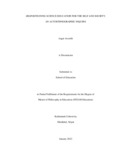
Please use this identifier to cite or link to this item:
https://hdl.handle.net/20.500.14301/135| Title: | (RE)POSITIONING SCIENCE EDUCATION FOR THE SELF AND SOCIETY: AN AUTOETHNOGRAPHIC INQUIRY |
| Authors: | Aagat Awasthi, Aagat |
| Citation: | Awasthi,A.(2023).(Re)positioning Science education for the self and society: An autoethnographic inquiry. |
| Issue Date: | Jan-2023 |
| Publisher: | Kathmandu University School of Education |
| School: | SOED |
| Department: | DOSE |
| Level: | M.Phil. |
| Program: | MPhil in STEAM Educaiton |
| Abstract: | I grew up in an environment that encouraged me to look at science as a local entity and embodiment of indigenous knowledge and for my parents and grandparents, this knowledge of science was so important that it impacted their day-to-day life and the activities they performed. I also became part of this ‘knowledge-transfer chain’ and this was my first exposure to science education. However, during my school, I often felt a missing link between the science education I was learning at school and the world I was living in. The teaching of science was textbook-based, disconnecting students from their lives and intimate realities (Bajracharya & Brouwer, 1997). From what I experienced, school education has not fully succeeded in cultivating interest in the minds of students like me for exploring nature and their environment. I also began to view science as the most significant subject in school, and I developed the belief that science is superior to all other subjects as I was growing up. This perception was attributed to the social standing, prestige, and potential career path connected to the study of science. My impression towards science developed primarily due to my family environment, social networks and the community (Fabiansson, 2015). I was able to reflect on my educational journey and deepen my understanding of the world thanks to my participation in the MPhil programme, with a focus on science education in particular. I gained theoretical understanding and practical insights that helped me to better understand the various STEAM education lenses. This opportunity also gave me a foundation for (re)connecting my past experiences of science education with new worldviews and inspired me to start this research inquiry. I concentrated on re establishing the connection between science and everyday life in my research and made an effort to look into the space provided in science education for students to reflect on their social contexts. As a method of inquiry, I found autoethnographic design (Adams et al., 2016, 2021; Creswell, 2012; Ortiz-Vilarelle, 2021) to be the most appropriate for my particular study. I explored my lifeworld and investigated the value of science education to me as an individual, as a professional, and as a social being through my personal professional as well as societal lived experiences. My narratives are divided into three themes: science education as/for personal (ir)relevance (Chapter Three), Science education as/for professional (ir)relevance (Chapter Four), and science education as/for social (ir)relevance (Chapter Five). In the process of unpacking my experiences, I realised that the teaching of science was decontextualised, textbook-based, didactic, and encouraged rote learning (low level of cognitive achievement). My study unfolded the need for transformation from technical interest in teaching and learning practices to emancipatory interest; reconceptualisation of curricula from subject-centric to thematic transdisciplinary approach; and harmonisation of learners’ engagement across cognitive, affective, and psychomotor learning domains, allowing students to develop reflective and critical awareness. These insights provided me with the opportunity to crystalise my vision (Chapter Six) and deepen my engagement in STEAM education. |
| URI: | https://hdl.handle.net/20.500.14301/135 |
| Appears in Collections: | Dissertation |
Files in This Item:
| File | Description | Size | Format | |
|---|---|---|---|---|
| MPhil_STEAM_Aagat Awasthi.pdf | 1.21 MB | Adobe PDF |  View/Open |
Items in DSpace are protected by copyright, with all rights reserved, unless otherwise indicated.